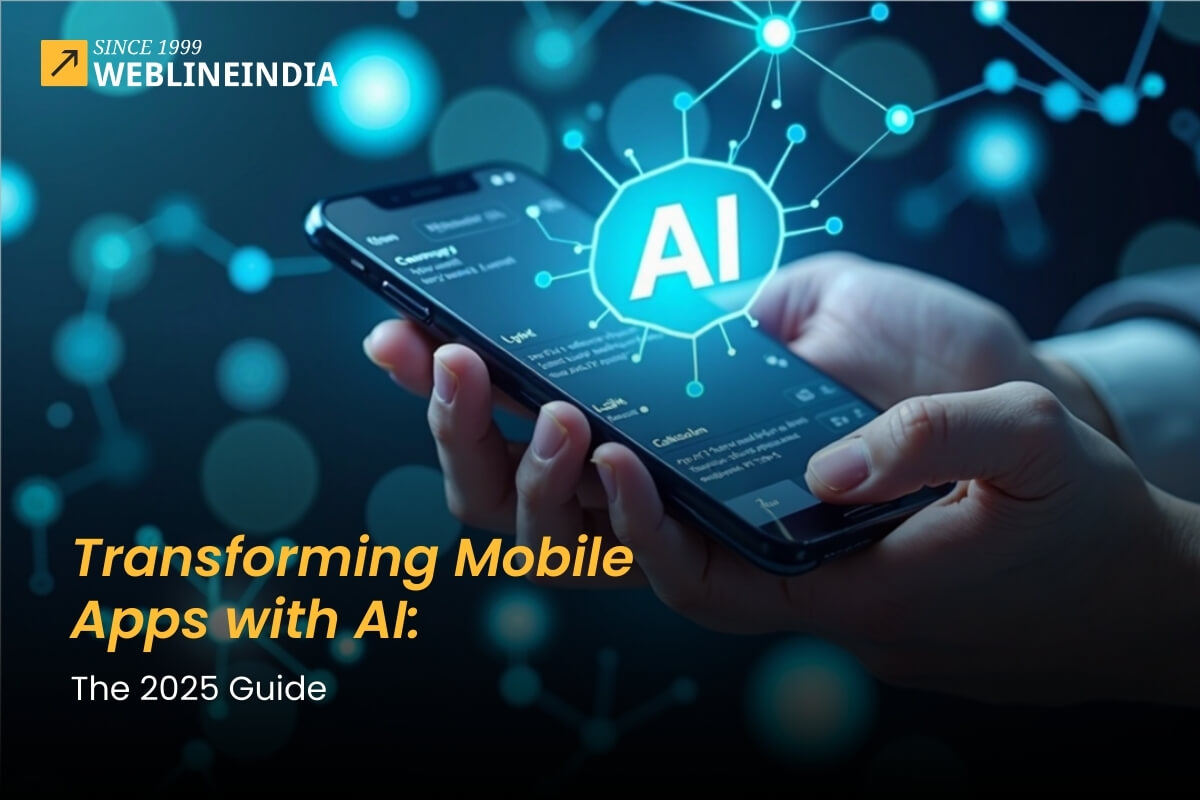Listen to the podcast :
As we progress into 2025 and beyond, AI in mobile apps is becoming a dominant force in the development of mobile applications. Artificial intelligence is transforming the way mobile apps operate, improving user experiences, optimizing processes, and even driving new business models.
According to Market.US, the Global AI in Mobile Apps Market size is expected to be worth around USD 249.8 Billion by 2033, from USD 16.7 Billion in 2023, growing at a CAGR of 33.7% during the forecast period from 2024 to 2033.
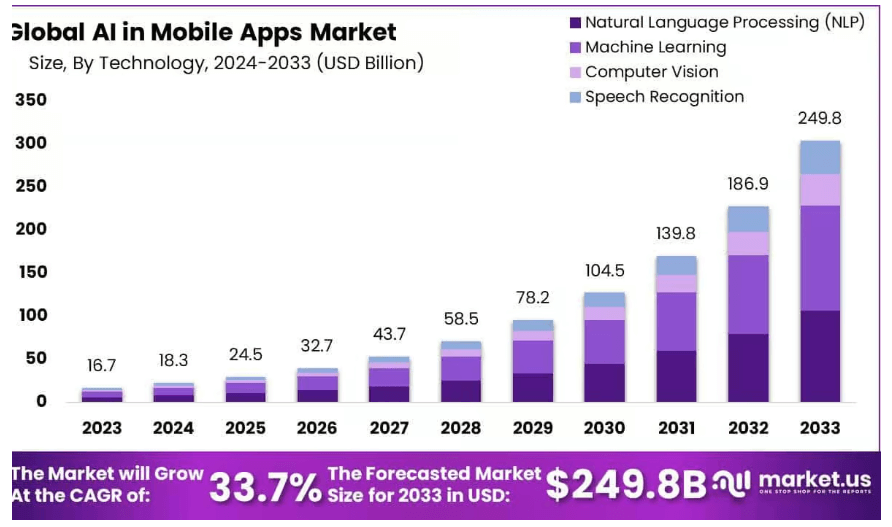
In this comprehensive guide, we will explore the key ways in which AI in mobile applications is reshaping industries, offering smart solutions, and how WeblineIndia is at the forefront of implementing these technologies in mobile app and software development.
Looking to Integrate AI into Your Mobile App with a Team of Next-gen Experts?
The Rise of AI in Mobile Applications
The integration of AI into mobile apps has witnessed explosive growth in recent years. This surge can be attributed to several key factors:
- Increased Processing Power: Advancements in mobile hardware, such as the development of more powerful processors and dedicated AI chips, have significantly enhanced the ability of mobile devices to handle complex AI computations efficiently. This increased processing power allows for more sophisticated AI models to be deployed on mobile devices, enabling a wider range of AI-powered features and functionalities.
- Accessibility of AI Tools: The availability of pre-trained models, APIs, and development frameworks has made it easier for developers to integrate AI into their mobile apps. Cloud-based AI services, such as Google Cloud AI Platform and Amazon SageMaker, provide developers with access to powerful AI tools and resources, making it easier to build and deploy AI-powered mobile applications.
- Growing Demand for Personalized Experiences: In today’s digital age, users have come to expect personalized experiences. AI provides the tools to deliver tailored recommendations, content, and interactions, meeting this growing demand for personalized experiences.
Today, AI in mobile apps is not just a buzzword; it’s a critical component that allows for smarter, more personalized applications. Through AI app development, apps can adapt to user behavior, optimize processes, and even predict future needs. In 2025, AI will continue to evolve mobile apps, making them more intuitive and responsive.
From personalization features to automation, AI is opening new doors in app development, allowing businesses to create apps that deliver richer, more meaningful user interactions. With advancements in machine learning, natural language processing, and computer vision, AI in mobile applications will continue to be a game-changer for both developers and users alike.
How AI is Transforming Mobile Apps?
AI is transforming mobile apps in numerous ways, enhancing user experiences and unlocking new possibilities for businesses:
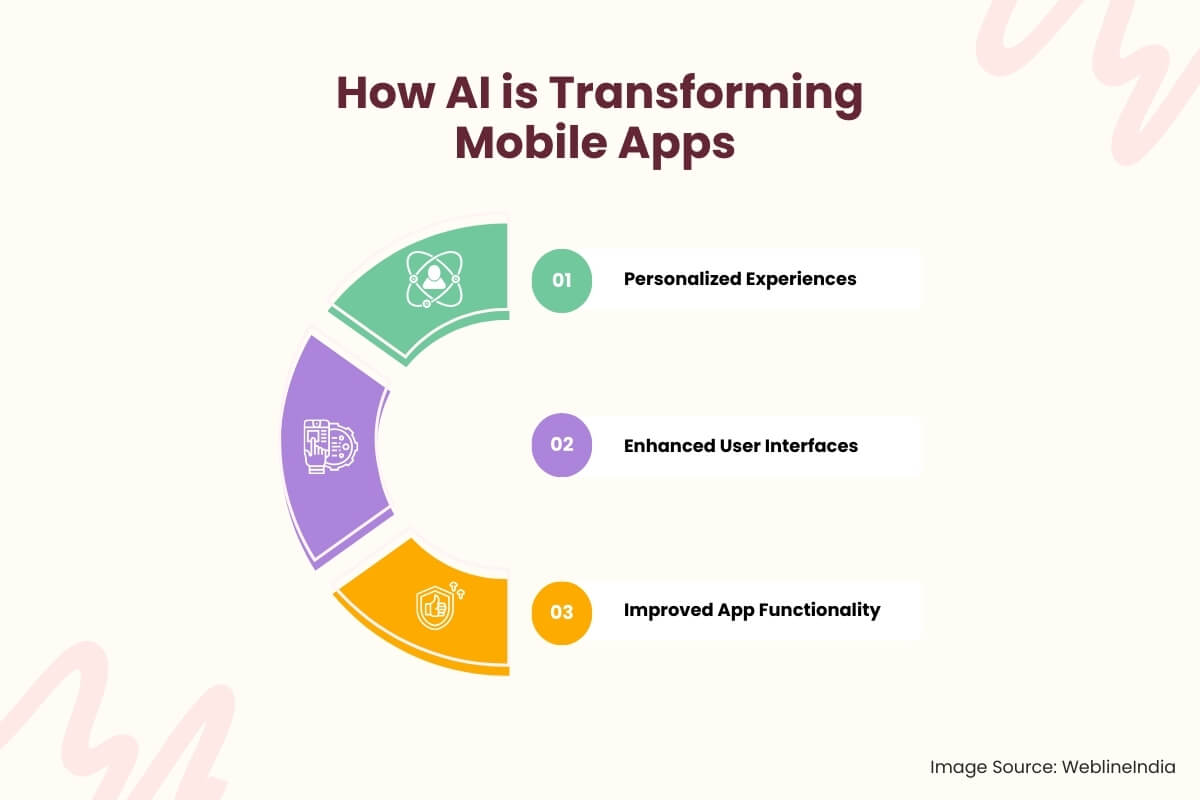
Personalized Experiences
AI enables hyper-personalization by analyzing user data, preferences, and behavior to deliver tailored experiences that are unique to each individual user.
- Personalized Recommendations: AI algorithms can analyze user data, such as browsing history, purchase history, and app usage patterns, to provide highly relevant and personalized recommendations for products, services, and content. This can be seen in apps like Netflix, Spotify, and Amazon, which utilize AI to recommend movies, music, and products based on individual user preferences.
- Personalized Content: AI can curate and deliver personalized content, such as news articles, social media posts, and advertisements, based on user interests and browsing history. This ensures that users are presented with content that is relevant and engaging to them, improving their overall app experience.
Enhanced User Interfaces
AI is revolutionizing user interfaces through the use of natural language processing (NLP), computer vision, and machine learning.
- Voice Assistants: AI-powered voice assistants, such as Siri and Google Assistant, are becoming increasingly prevalent in mobile apps, enabling users to interact with apps using voice commands. This hands-free interaction enhances accessibility and improves the overall user experience.
- Chatbots: AI-powered chatbots are transforming customer service by providing instant and personalized support. They can answer user questions, resolve issues, and even guide users through complex tasks, improving customer satisfaction and reducing the burden on customer support teams.
Improved App Functionality
AI is enhancing core app functionalities, such as image recognition, search, and navigation, making them more efficient and effective.
- Image Recognition: AI-powered image recognition capabilities enable apps to identify objects, scenes, and faces within images. This enables features like visual search, augmented reality (AR), and image-based product recommendations.
- Search Refinement: AI algorithms can improve search results by understanding user intent and providing more relevant and accurate results. For example, instead of simply returning a list of matching keywords, AI-powered search can understand the context of the user’s query and provide more relevant and personalized results.
- Smart Navigation: AI can optimize navigation within apps, providing users with personalized routes, recommendations, and real-time traffic updates. This can enhance the user experience and make it easier for users to find what they are looking for within the app.
Key AI Technologies in Mobile Apps
Several key AI technologies are driving innovation in mobile apps:
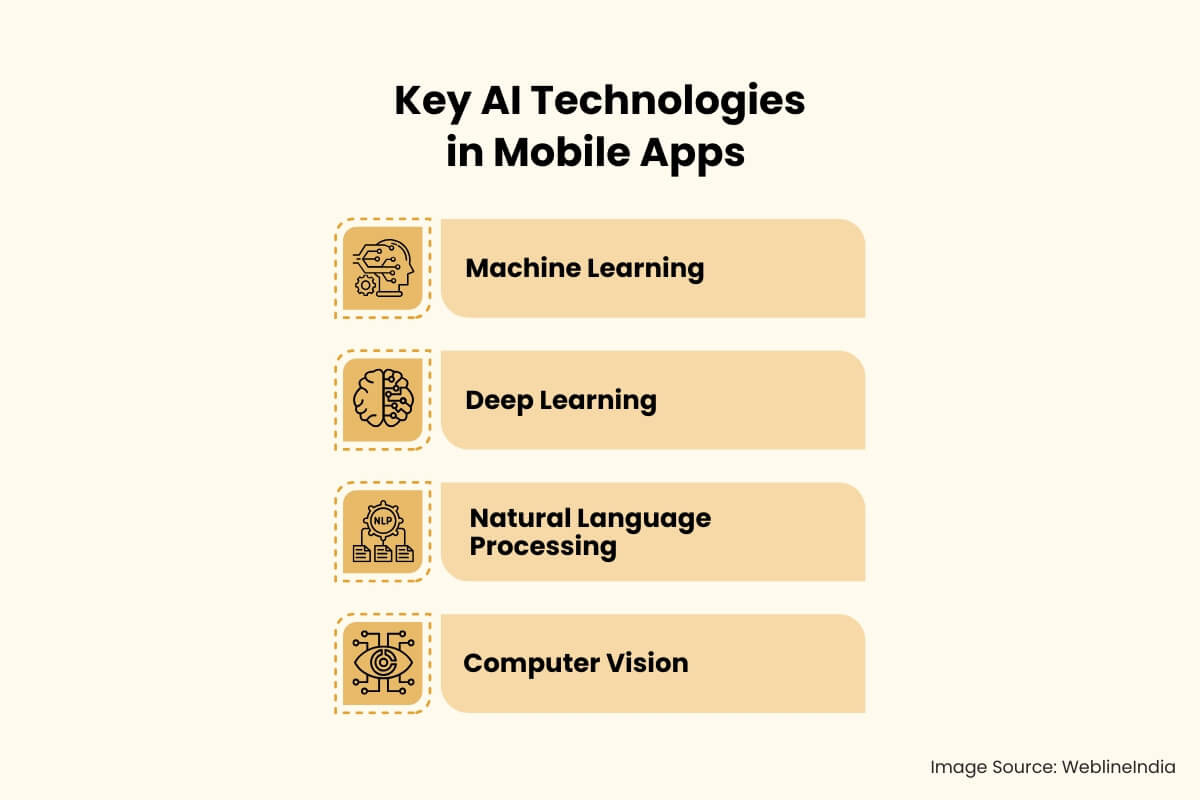
- Machine Learning: Machine learning algorithms enable apps to learn from user data and make predictions or decisions without explicit programming. These algorithms can identify patterns, trends, and relationships within data, allowing apps to adapt and improve over time.
- Deep Learning: Deep learning, a subset of machine learning, utilizes artificial neural networks to analyze complex data, such as images, speech, and natural language. Deep learning models can extract high-level features from data, enabling them to perform complex tasks such as image recognition, natural language understanding, and speech recognition with high accuracy.
- Natural Language Processing (NLP): NLP enables apps to understand and interpret human language, enabling features like voice search, chatbots, and sentiment analysis. NLP algorithms can analyze the meaning and intent of user input, allowing apps to respond in a more natural and human-like manner.
- Computer Vision: Computer vision enables apps to interpret and understand visual information, such as images and videos. This enables features like image recognition, object detection, and augmented reality, which can enhance the user experience and unlock new possibilities for mobile applications.
Curious How Mobile Apps Built with AI Can Transform Your Business?
AI in Mobile Apps for Automation: Reducing Manual Work
One of the most significant benefits of AI in mobile apps is automation. With artificial intelligence app development, tedious, repetitive tasks can be automated, freeing up valuable time for both users and businesses. Whether it’s automating customer support or managing app data, AI in mobile applications improves productivity and efficiency.
Automation powered by AI can drastically reduce human error and improve the accuracy of task execution. Tasks such as data entry, lead generation, or user feedback collection can be automated, allowing businesses to streamline operations and improve service delivery.
How AI Drives Automation:
- Task Automation: AI automates simple tasks like appointment scheduling or email follow-ups, allowing users to focus on more critical aspects.
- Data Management: AI systems automatically organize, categorize, and analyze data, providing actionable insights to businesses without manual intervention.
- Customer Support: AI chatbots handle customer inquiries 24/7, providing immediate support without the need for human intervention.
AI in Mobile Apps for Predictive Analytics and Decision Making
AI in mobile applications plays a crucial role in predictive analytics, enabling businesses to anticipate user behavior and make data-driven decisions. With AI app development, apps can process historical data and identify patterns that provide valuable insights into user actions, preferences, and potential needs.
Predictive features powered by AI can suggest next steps, offer recommendations, or even alert users to important events based on anticipated needs. This is incredibly valuable in areas like e-commerce, healthcare, or finance, where anticipating customer behavior can result in significant business advantages.
Applications of AI in Predictive Analytics:
- Behavioral Predictions: AI can predict when a user is likely to make a purchase or when they might require customer support, helping businesses to act proactively.
- Demand Forecasting: In retail apps, AI analyzes customer trends to forecast product demand, optimizing inventory management.
- Customer Retention: AI can predict when users may disengage with an app, prompting businesses to take action to retain them.
AI in Mobile Apps for Security: Enhancing User Safety
As mobile applications continue to become integral to users’ daily lives, security remains a top concern. AI in mobile applications can strengthen security protocols and improve data protection, reducing the risk of cyber threats. Artificial intelligence app development provides advanced security features like biometric authentication, facial recognition, and AI-powered fraud detection.
AI can continuously monitor app activities and identify potential security risks in real-time, providing a level of proactive defense that is crucial in today’s increasingly digital environment. This is especially important for apps that handle sensitive data such as banking, healthcare, or personal identification.
Key AI Security Features:
- Biometric Authentication: AI-enabled facial recognition or fingerprint scanning ensures only authorized users can access sensitive app features.
- Fraud Detection: AI analyzes patterns and behaviors to detect unusual activity, preventing fraud or unauthorized access.
- Real-Time Threat Monitoring: AI algorithms detect potential security breaches, alerting users and administrators to take action immediately.
The Future of AI in Mobile Applications
The future of AI in mobile applications is bright and full of exciting possibilities:
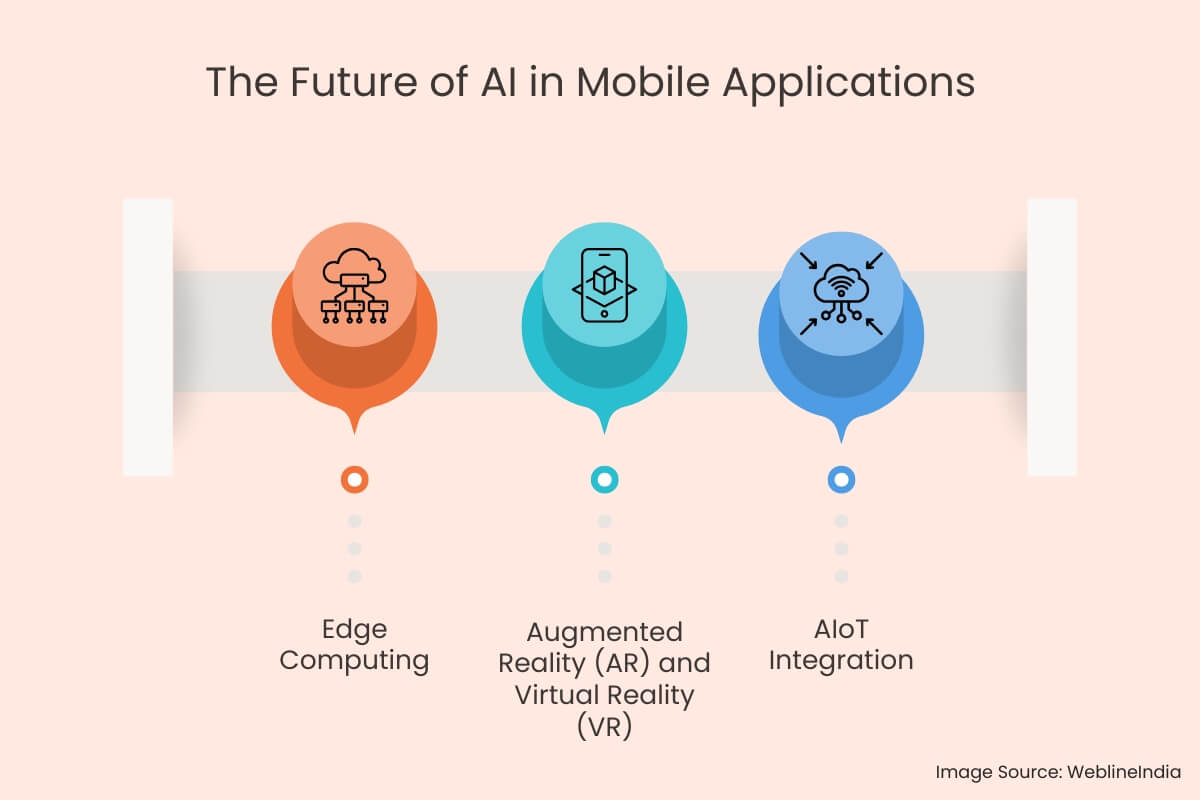
- Edge Computing: With the rise of edge computing, AI processing will shift from cloud servers to mobile devices. This will enable faster processing speeds and reduced latency, allowing for more real-time and responsive AI-powered features.
- Augmented Reality (AR) and Virtual Reality (VR): AI will play a crucial role in enhancing AR and VR experiences, creating more immersive and interactive mobile applications. AI can be used to power realistic and interactive virtual environments, personalize AR experiences, and provide more intuitive and natural interactions with virtual objects.
- AIoT Integration: The integration of AI with the Internet of Things (IoT) will unlock new possibilities, enabling smart homes, smart cities, and a more connected world. AI-powered mobile apps can serve as the central hub for controlling and managing IoT devices, providing users with a seamless and intuitive interface for interacting with their connected devices.
The Role of WeblineIndia in AI-Powered Mobile App Development
At WeblineIndia, we understand the transformative power of AI in mobile applications. We leverage our expertise in AI for mobile app development to help our clients create innovative and successful mobile apps.
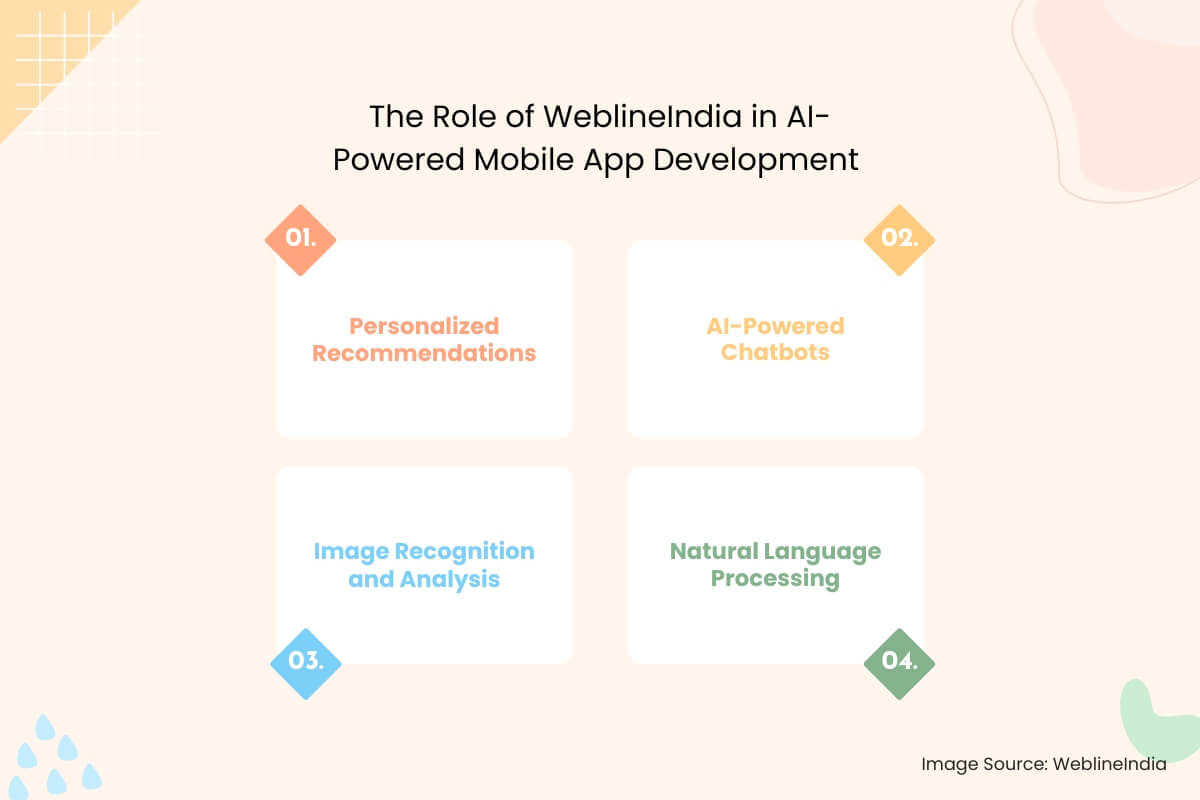
Our team of experienced developers and designers can help you integrate the latest AI technologies into your mobile app, including:
- Personalized Recommendations: We can develop sophisticated recommendation systems that provide users with personalized experiences, such as personalized product recommendations, content recommendations, and personalized offers.
- AI-Powered Chatbots: We can create engaging and informative chatbots that provide personalized support and guidance to users. These chatbots can answer user questions, resolve issues, and even guide users through complex tasks, improving customer satisfaction and reducing the burden on customer support teams.
- Image Recognition and Analysis: We can integrate image recognition technology into your app to enable features such as visual search, object detection, and image-based product recommendations. This can enhance the user experience and provide new and innovative ways for users to interact with your app.
- Natural Language Processing: We can leverage NLP to enable voice search, chatbots, and other conversational interfaces within your app. This allows users to interact with your app more naturally and intuitively, improving the overall user experience.
We work closely with our clients to understand their unique needs and develop customized AI solutions that meet their specific requirements. Whether you’re looking to create a new mobile app or enhance an existing one, WeblineIndia can help you hire AI developers to achieve your goals.
WeblineIndia can significantly accelerate the mobile app development or software development process by utilizing the latest AI tools and techniques. AI can be used to automate various aspects of the development process, such as code generation, testing, and deployment. This can lead to faster development cycles, reduced costs, and improved overall efficiency.
Furthermore, WeblineIndia helps our clients integrate the best AI features to enhance their digital products, whether it’s a mobile app or a website. This includes features such as personalized recommendations, chatbots, and predictive analytics, which can significantly improve user engagement and satisfaction.
Social Hashtags
#AIinMobileApp #AIApps #MobileInnovation #ArtificialIntelligence #AppDevelopment #AIIntegration #AIinBusiness #AIForAutomation
Ready to Revolutionize Your Business with AI-Powered Intelligent Mobile Apps?
Testimonials: Hear It Straight From Our Customers
Our development processes delivers dynamic solutions to tackle business challenges, optimize costs, and drive digital transformation. Expert-backed solutions enhance client retention and online presence, with proven success stories highlighting real-world problem-solving through innovative applications. Our esteemed clients just experienced it.
